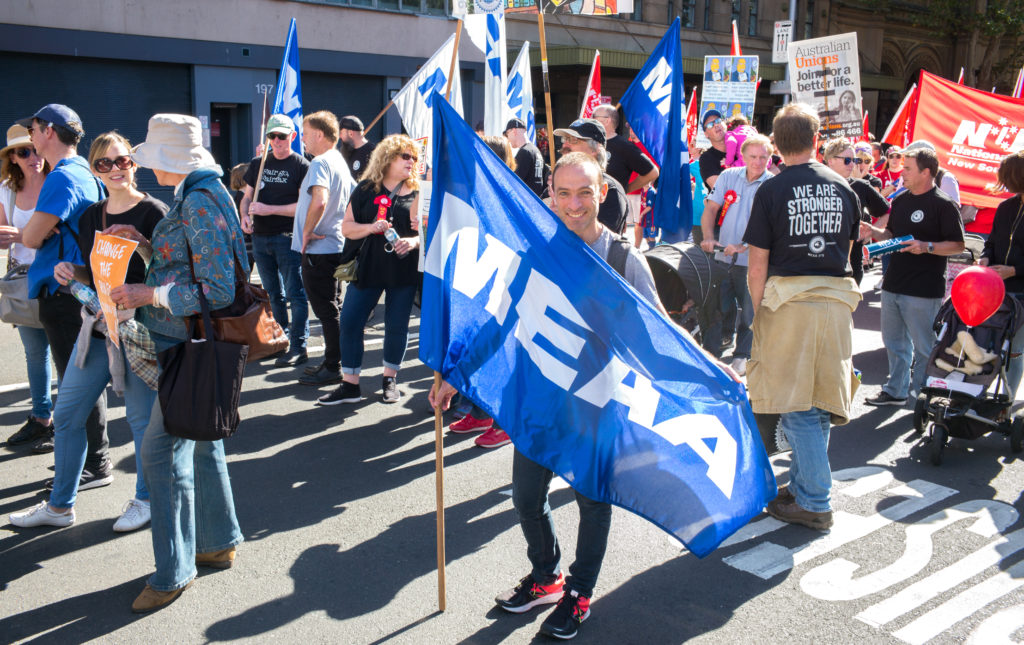Chief Executive’s Report

MEAA at the Change The Rules rally, Sydney, 6 May 2018. Photo: Paul Davies
A message to all members from Chief Executive Paul Murphy from MEAA’s 2017–18 Annual Report.
 The last year has been a challenging time for MEAA, as our industries continue to face turbulence from funding cuts, technological change and an increasingly hostile industrial relations landscape.
The last year has been a challenging time for MEAA, as our industries continue to face turbulence from funding cuts, technological change and an increasingly hostile industrial relations landscape.
The membership and financial results we have been able to achieve in this time are particularly pleasing in light of those challenges, and are a credit to the hard work of our staff and the passion and commitment of members and delegates.
During the past year MEAA has continued to consolidate our position as the union and advocate for Australia’s creative professionals. We have campaigned vigorously on behalf of our members, seen our membership grow, negotiated key enterprise agreements, engaged with stakeholders to protect and bolster our industries, and expanded MEAA’s reach to workers in new areas.
MEAA’s strategic framework has five key objectives and during the year we have delivered on those areas.
We protect and advance our members’ rights at work. We began the year by working on a new national film and television safety code. We won better pay and conditions for dancers at the Australian Ballet; called for concrete action by media organisations to close the gender pay gap; condemned assaults on press freedom including laws that criminalise journalism.
We build power. MEAA achieved ongoing membership growth in the Equity and Entertainment, Crew & Sport sections, offsetting modest declines in the membership of the Media and Musicians sections. We launched the Good Jobs Charter for Digital Media as part of our push to introduce a fair set of workplace standards in this sector; and rolled out our CommsPro membership for communications professionals in not-for-profit and non-government organisations.
A key objective is to build community. Elections for our Federal Council introduced 32 new members to the key decision-making body of the union, drawn from every section. We hit the streets to rally to Change the Rules and demand that government keeps its #HandsOffOurABC.
We campaigned to counter harassment, discrimination and bullying in our industries.
We aim to shape our industries. We worked on introducing a new national safety code for film and TV, launched the Make It Australian campaign bringing industry stakeholders together to fight for the future of the screen industry; and condemned the Government’s funding cuts to the ABC.
Our fifth key objective is to provide services that our members value. We have developed a powerful service in our National Industrial Team, providing key assistance to members as they negotiate agreements, ensure their rights at work are protected and provide reassurance as they face upheaval in their industry as well as offering assistance or further training as they move on in their careers.
While our membership growth is encouraging, this by no means suggests we are out of the woods. Maintaining membership, and achieving modest growth, will always be a challenge. This is true for unions around the world, and indeed for all membership‐based organisations.
Likewise our financial position requires constant attention and a careful focus on reducing costs wherever possible. Our members would expect nothing less. All of the money we receive and all of the assets we hold belong to them.
In common with other unions, MEAA is finding it increasingly difficult to achieve substantial pay rises in bargaining and to pursue agreement breaches. That is why the Change The Rules campaign initiated by the ACTU is so important, and why MEAA needs to take an active part in it.
In particular, the restoration of arbitration powers to the Fair Work Commission, the return of industry‐wide bargaining as an option, and collective bargaining rights for freelancers/contractors would be of enormous benefit to our industrial work.
MEAA has consolidated its position and continues to look for new areas for growth. But we can never be complacent.
In common with our industries, constant innovation and change is required. We have to ensure we are meeting the needs of our existing and potential members.